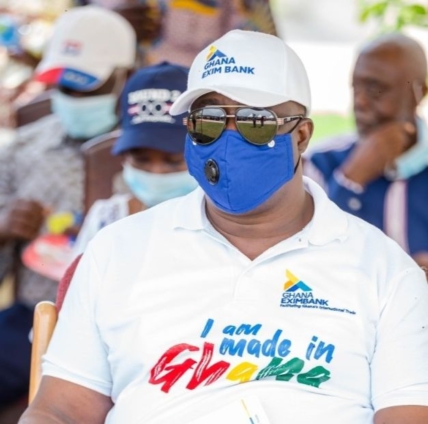
Audio By Carbonatix
The Manufacturing sector for any economy is considered the backbone of economic development.
Manufacturing industries do not only help in modernizing agriculture, but they also reduce the heavy dependence of people on agricultural income.
In 2017, it was estimated that the manufacturing Industry in Ghana accounts for about 25.3% of total GDP.
Ghana's industrial production is rising at a rate of 7.8%, making it the 38th fastest-growing industrial production in the world due to government’s industrialization policies.
Locally produced goods reduce the level of importation and help keep a robust economy especially in cases of global emergencies like the Covid-19 pandemic, which led to the closing of borders.
However, for a product to be truly accepted, packaging and promotion play an important role as it raises the products appeal to consumers.
First-time buyers will make a purchasing decision of products in a similar category based on the packaging of the product.
Though significant strides have been made, Ghanaian manufacturers and producers have not yet fully leveraged the opportunities provided by the increasing purchasing power and modern lifestyle of a growing middle class, as well as potential external markets.
Made in Ghana initiatives
Part of GEXIM’s mandate is to assist in the promotion of locally produced goods and services to enhance export revenue generation, improve import-substitution, add value, and create employment in the country.
With GEXIM funding 1D1F initiatives, raw materials are processed into finished products that are colourfully packaged to attract not only local but also, foreign consumers.
The Made-in-Ghana concept emphasises the need for Ghanaians to take pride in their national heritage, promote made in Ghana products and patronise and use products which are locally produced in the country.
The tourism sector has contributed significantly to this call, transcending the borders of Ghana to the rest of the world with Ghana’s arts, music, dance, food, fashion and culture.
1D1F and Made-in-Ghana
Building on several years of robust growth, the government has instituted the One District, One Factory (1D1F) initiative to increase industrial capacity and output. This is to boost the value-added components of the country’s manufactured exports.
With this in view, GEXIM has funded the establishment of indigenous factories, which are helping to process raw materials into secondary products thereby encouraging the production and purchasing of Made in Ghana products hence, limiting our dependence on foreign goods or products.
With the focus on poultry pharmaceuticals, cassava, shea butter, garments, pineapples and mangoes, the creative arts, oil palm, cashew, and cocoa, GEXIM is positioned for a Made-in-Ghana drive that exposes the finished products derived from these raw materials.
Proudly made-in-Ghana
Ekumfi Juice Factory, a fully owned Ghanaian enterprise, is one of the biggest fruits processing factories in West Africa instituted under 1D1F.
Currently, the factory produces Eku Juice, a 100% pineapple drink with no additives or concentrates, which has given it an edge over other brands on the market and placed Ghana on the international radar when it comes to the competition of fruit juice products on the export market.
Under the Government’s 1D1F initiative and financed by GEXIM, Casa De Ropa, a greenfield project, has the capacity of producing 250 tons of potato every 6 months and can produce some 7,200 tons of pastries per day.
Casa De Ropa is an agro-processing factory which processes orange-fleshed sweet potato into bread, potato cake, doughnut, chips, and other pastries.
The orange-fleshed sweet potato is “locally produced and forms more than 50% of its inputs, in the production of chips, bread and biscuits, substituting a percentage of imported flour with the fresh roots of the Orange Flesh Sweet Potato produced by the local farmers.”
Akro farms, on the other hand, is reducing poultry importation in Ghana by producing poultry and poultry product for local consumption and exports. The company produces fresh and heathy table eggs, chicken feed, broilers, processed chicken, and day-old chicks.
1D1F has opened avenues for Ghanaians to own their space by producing, promoting, and purchasing Made-in-Ghana products for the prosperity of Ghana.
According to PWC, “the manufacturing sector is poised for significant growth over the next few years and new policies have been put in place by the Government to create an enabling environment, with an emphasis on manufacturing and exports.
1D1F is a laudable initiative to make Ghana industrialised and an export-led economy.
The aim of this policy is to create jobs for Ghanaians through the setting up of factories and industries which will empower communities to utilize their local resources in manufacturing products that are in high demand both locally and internationally.
To sustain this, people must, as a matter of urgency, produce, promote and purchase made in Ghana products for a prosperous economy.
Latest Stories
-
Man Utd ‘could make January signing’ amid Neves link
3 hours -
Yamal strikes as leaders Barcelona go 4 points clear
4 hours -
Kane scores as Bayern thrash Heidenheim to end year on high
4 hours -
Ontario Police bust international car theft ring including Ghanaian with 306 stolen vehicles recovered
4 hours -
Liverpool fear significant lower leg injury for Isak
4 hours -
Host Morocco beat stubborn Comoros in AFCON opener
4 hours -
Man Utd face up to ‘massive’ loss of injured Fernandes
5 hours -
AFCON 2025: Morocco second half brilliance seals win over Comoros in opener
5 hours -
Boankra Integrated Logistics Terminal: Tribunal orders Justmoh Construction to refund $33.3m to APSL
5 hours -
Fitch affirms Bank of Africa at ‘BB’; outlook stable
6 hours -
Fuel prices: Ghana ends year at 23rd position in Africa
6 hours -
Remain vigilant during the festivities; cybercriminals do not take holidays – CSA cautions
6 hours -
NSA to close registration portal for 2025/2026 National Service year
7 hours -
BoG Governor targets single-digit interest rates to boost businesses
7 hours -
BAWA-ROCK Ltd honoured for sustainable gold trading at Africa Development Conference
7 hours

